The redrawing of North Carolina's state legislative map has started, as legislators look to meet the Sept. 18 deadline imposed by the three-judge panel that ruled the old map unconstitutional.
Republican lawmakers on the House and Senate redistricting committees proposed using districts that were generated as part of models by University of Michigan redistricting expert Jowei Chen, who testified for plaintiffs during the trial, the Raleigh News & Observer reported. Most Democratic lawmakers are on board with use of the maps, given the time constraints.
The final maps will have to be approved by both General Assembly chambers.




















Trump & Hegseth gave Mark Kelly a huge 2028 gift